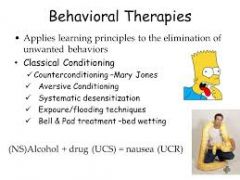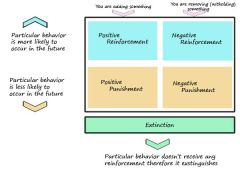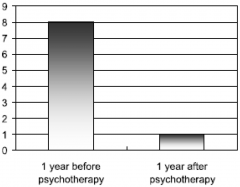![]()
![]()
![]()
Use LEFT and RIGHT arrow keys to navigate between flashcards;
Use UP and DOWN arrow keys to flip the card;
H to show hint;
A reads text to speech;
21 Cards in this Set
- Front
- Back
|
Treatment of Psychological Disorders |
|
|
|
Psychotherapies: Psychological Approaches to Mental Disorders |
- Psychoanalytic and Psychodynamic Therapies
- free association - interpretation of dreams - interpretation of resistances - interpretation of transference |
|
|
Psychotherapies: Psychological Approaches to Mental Disorders |
- Humanistic therapists focus on clients' current conscious feelings and on their taking responsibility for their own growth. - Existential therapists focus on finding meaning to face life. |
|
|
Psychotherapies: Psychological Approaches to Mental Disorders |
|
|
|
Classical Conditioning Techniques |

|
|
|
Operant Conditioning Techniques |

|
|
|
Psychotherapies: Psychological Approaches to Mental Disorders |
Cognitive Behavioral Therapies Assuming that unpleasant emotions stem from negative beliefs, cognitive-behavioral therapists encourage their clients to consider the accuracy of their thoughts about themselves, their world, and others. |
|
|
Group and Family Therapy |
- Rejection of "I.P." - Sees problems as systemic - Family hx; group dynamics; - Move beyond blame to description & alternation |
|
|
Psychotherapy: Is It Effective? |

|
|
|
Psychotherapy: Is It Effective? |
- Are Some Forms of Therapy More Successful Than Others? |
|
|
BioMedical Therapy |
|
|
|
Biological Therapies |
Psychoactive drugs have been highly successful in reducing in-patient population. - Mental Hospital Population |
|
|
Antipsychotic Drugs |
Neuroleptics may cause Tardive Dyskineisia
|
|
|
Antidepressants |
- MAOI's (Monoamineoxidase inhibitors)
|
|
|
Antidepressants |
Tricyclics
Amitriptyline (Elavil, Endep, Levate, Novotriptyn, Apo-Amitriptyline) Amoxapine (Asendin) Clomipramine (Anafranil) Desipramine (Norpramin, Sinequan) Imipramine (Norfranil, Tofranil) Nortriptyline (Aventyl, Pamelor) |
|
|
Antidepressants |
SSRI’s (Selective Serotonin-Reuptake Inhibitors)
SSRIs – have fewer side effects - Fluoxetine (Prozac) - Fluvoxamine (Luvox) - Paroxetine (Paxil) - Setraline (Zoloft) - Citalopram (Celexa) |
|
|
Mood Stabilizers (For Bipolar Disorder) |
Lithium Carbonate (Lithiumate, Eskalith) evens out the mood swings of bipolar patients - must be carefully monitored
Other mood stabilizers: Carbamazepine (Tegretol), Divalproex (Depakote), Topiramate (Topamax) |
|
|
Anxiolitics |
Benzodiazapines (Librium, Valium, Xanax)
Xanax more effective but somewhat addictive |
|
|
Psychosurgery |
Cingulotomies and other microsurgeries sometimes done today; they were initially developed for the treatment of intractable pain, but have been used in to treat anxiety disorders, depressive disorders, and OCD
|
|
|
Electroconvulsive Therapy (ECT) |
An effective treatment for depression & mania not responsive to drugs
May cause temporary memory loss Works by altering neurotransmitter balance |
|
|
When you or someone you know could benefit from psychotherapy ... |
How to Choose a Therapist Recognizing that therapy is appropriate
College Counseling Centers, Referrals Credentials (e.g., psychiatrist, psychologist, etc.) Be up front about goals, both in terms of timeframe and issues to be worked on. |

